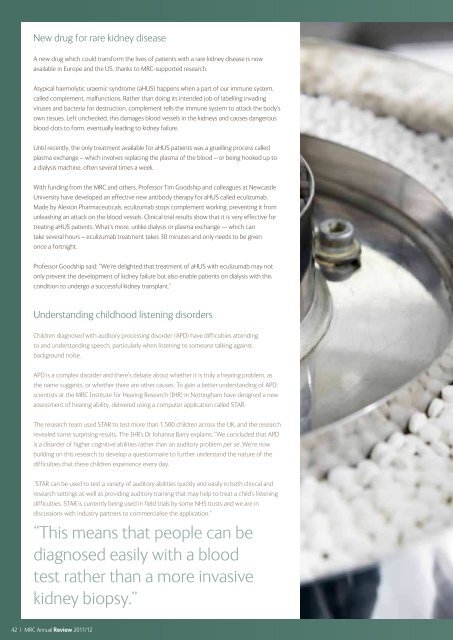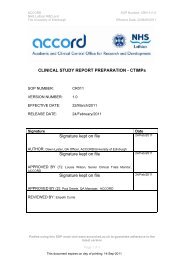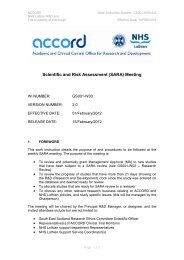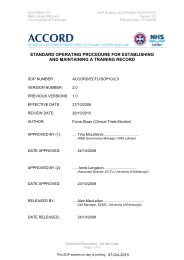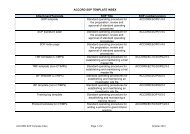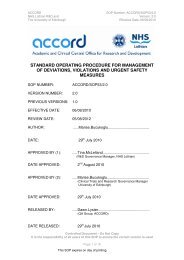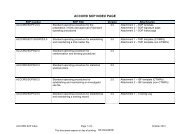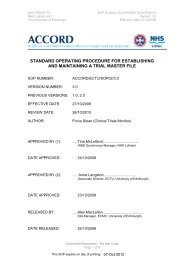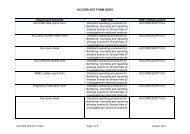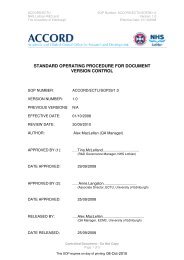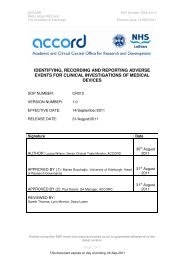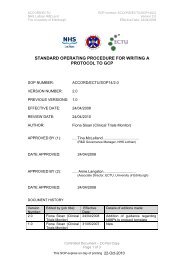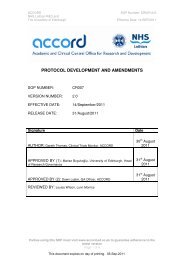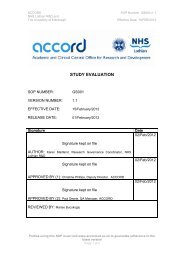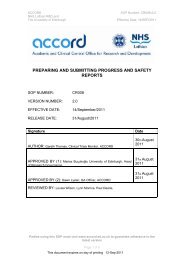Advancing medicine, changing lives - Medical Research Council
Advancing medicine, changing lives - Medical Research Council
Advancing medicine, changing lives - Medical Research Council
You also want an ePaper? Increase the reach of your titles
YUMPU automatically turns print PDFs into web optimized ePapers that Google loves.
New drug for rare kidney disease<br />
A new drug which could transform the <strong>lives</strong> of patients with a rare kidney disease is now<br />
available in Europe and the US, thanks to MRC-supported research.<br />
Atypical haemolytic uraemic syndrome (aHUS) happens when a part of our immune system,<br />
called complement, malfunctions. Rather than doing its intended job of labelling invading<br />
viruses and bacteria for destruction, complement tells the immune system to attack the body’s<br />
own tissues. Left unchecked, this damages blood vessels in the kidneys and causes dangerous<br />
blood clots to form, eventually leading to kidney failure.<br />
Until recently, the only treatment available for aHUS patients was a gruelling process called<br />
plasma exchange – which involves replacing the plasma of the blood – or being hooked up to<br />
a dialysis machine, often several times a week.<br />
With funding from the MRC and others, Professor Tim Goodship and colleagues at Newcastle<br />
University have developed an effective new antibody therapy for aHUS called eculizumab.<br />
Made by Alexion Pharmaceuticals, eculizumab stops complement working, preventing it from<br />
unleashing an attack on the blood vessels. Clinical trial results show that it is very effective for<br />
treating aHUS patients. What’s more, unlike dialysis or plasma exchange -– which can<br />
take several hours – eculizumab treatment takes 30 minutes and only needs to be given<br />
once a fortnight.<br />
Professor Goodship said: “We’re delighted that treatment of aHUS with eculizumab may not<br />
only prevent the development of kidney failure but also enable patients on dialysis with this<br />
condition to undergo a successful kidney transplant.”<br />
Understanding childhood listening disorders<br />
Children diagnosed with auditory processing disorder (APD) have difficulties attending<br />
to and understanding speech, particularly when listening to someone talking against<br />
background noise.<br />
APD is a complex disorder and there’s debate about whether it is truly a hearing problem, as<br />
the name suggests, or whether there are other causes. To gain a better understanding of APD,<br />
scientists at the MRC Institute for Hearing <strong>Research</strong> (IHR) in Nottingham have designed a new<br />
assessment of hearing ability, delivered using a computer application called STAR.<br />
The research team used STAR to test more than 1,500 children across the UK, and the research<br />
revealed some surprising results. The IHR’s Dr Johanna Barry explains: “We concluded that APD<br />
is a disorder of higher cognitive abilities rather than an auditory problem per se. We’re now<br />
building on this research to develop a questionnaire to further understand the nature of the<br />
difficulties that these children experience every day.<br />
“STAR can be used to test a variety of auditory abilities quickly and easily in both clinical and<br />
research settings as well as providing auditory training that may help to treat a child’s listening<br />
difficulties. STAR is currently being used in field trials by some NHS trusts and we are in<br />
discussions with industry partners to commercialise the application.”<br />
“This means that people can be<br />
diagnosed easily with a blood<br />
test rather than a more invasive<br />
kidney biopsy.”<br />
“Eculizumab may not only prevent<br />
development of kidney failure but<br />
also enable patients on dialysis<br />
with this condition to undergo a<br />
successful kidney transplant.”<br />
Drug to boost transplant success<br />
Professor Stephen Wigmore and Dr Ewen Harrison at the University of Edinburgh used funding<br />
from the MRC Developmental Funding Pathway Scheme to progress development of a drug<br />
that they hope will improve organ transplant success rates.<br />
Naturally-occurring heat shock proteins (Hsps) help to protect cells from the kind of stresses<br />
that can cause damage during transplant surgery. The new drug, AT13387, works by increasing<br />
the number of protective Hsps present in body tissues that, in turn, could boost the chances<br />
of a transplant being successful. The researchers envisage that the drug would be used to treat<br />
the organ donor before surgery, or to treat the organ outside of the body prior to transplant.<br />
Professor Wigmore explained: ‘‘The heat shock protein therapy based on AT13387 has proven<br />
to be successful in preventing damage to cells in vitro and in a mouse model of kidney<br />
damage. The next step is to move on to a large animal study and into man where we hope<br />
enhancing the presence of heat shock proteins will make kidney and other tissue transplants<br />
even more successful for patients in the long term.’’<br />
On the trail of a rare disease<br />
An MRC fellow has tracked down a rare, previously unidentified, kidney disease to the Troodos<br />
Mountains in Cyprus — and developed a genetic test for the disease to boot.<br />
The kidneys of people with the disease are attacked by a part of the immune system called<br />
complement. When they have a minor infection such as a cold, this triggers complement to<br />
switch on, damaging the kidneys. Over time the kidneys scar and lose function, with 80 per<br />
cent of men with the disease showing kidney damage by age 50.<br />
Dr Danny Gale of the UCL Division of Medicine first discovered the disease in a Cypriot<br />
family in London. He found the mutation that causes the disease in a gene that regulates<br />
complement, and was able to pinpoint the origin of the mutation to a common ancestor of<br />
everyone with the disease who probably lived in the Troodos Mountains between 500 and<br />
3,000 years ago.<br />
Danny said: “This means that people can be diagnosed easily with a blood test rather than<br />
a more invasive kidney biopsy. It’s now offered nationwide on the NHS by the North East<br />
Thames molecular genetics laboratory and is used in Cyprus too.”<br />
The diagnosis also means that patients can be offered treatments, such as ‘plasma exchange’<br />
where a patient’s blood plasma — which contains complement — is swapped for donor<br />
plasma when their disease flares up.<br />
42 | MRC Annual Review 2011/12 MRC Annual Review 2011/12 | 43


